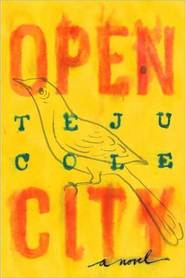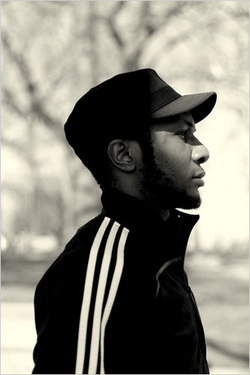 If observation is, by nature, an act that requires distance, what effect does that distance have on the observer? Is he less of his world, or more of it? Julius, the Nigerian psychiatry resident who narrates Teju Cole's exalting, yet mystifying novel Open City, seems to be a perfect argument for the former. He's a worldly and deeply intellectual thinker, a bedtime reader of Barthes and a devotee of Mahler, whose solitude amid three crowded cities (Brussels and Lagos, but mostly as an ex-pat in New York) allows him to see fresh meaning in objects, places, activities, and people about which we might've thought there was nothing left to say. A tree in Central Park for instance: A flock of tiny birds -- they might have been starlings -- swirled around a tree in the distance. I had the distinct impression that the tangled branches, and the birds that wove expertly in and out of them, were made of the same brown substance, the latter different only because they were in an active state. At any moment, I thought, the jagged little branches would unfold their hidden wings and the entire crown of the tree would become a living cloud. The surrounding trees, too, would lose their heads, leaving sentrylike stumps behind, and in the sky above the park there would be a massive canopy of starlings. What a haunting image, and how right. Metamorphosis, after all, isn't just a theme from Ovid; it's an ever-present possibility of human perspective. In the right light, in the right mood, branches and birds can be made of the same brown substance. That they most of the time are not makes this moment of unity all the more wondrous. Yet for all his clarity of observation, Julius lacks a lot. He is estranged from his German-born mother for reasons he doesn't fully explain. He says he wants to reconnect with his grandmother -- and even goes to Belgium, where she might live, to find her -- but his quest feels desultory at best. His closest male friend he refers to only as "my friend," as though he were just another fascinating stranger, like the Haitian shoe shiner or the Moroccan internet cafe clerk he encounters on his meditative walks. There is about Julius a constant deep and disquieting reserve.  Teju Cole For all that he knows about the world, and for all that he can see in it, he seems to lack some fundamental knowledge of himself. He mulls over the history of human cruelty (war, genocide, racism) a great deal, but when an old friend accuses him of past cruelty, he can't really respond, thinking instead of something he once read about Nietzsche. Julius's worldly, and often over-serious, memories and meditations are as governed by these lapses in self-knowledge as they are by his keen power of observation. "AIDS remained a devastating problem, especially for the poor, and for people who lived in the poorer countries," he declares in a passage on the horror of bed bugs. Yes, obviously, Julius! I wanted to shout. AIDS is worse than bed bugs! Even in your melancholy, you have to be able to recognize that! At the time, the line read like poor judgment on Cole's part -- an editorial lapse at best -- but I guess it's possible that we are supposed to balk at Julius's failed sense of proportion. The same eyes that merge branches and birds might, despite years of moral reading and training, merge AIDS and bed bugs as well. The acquisition of knowledge and the writing of literature are, in some ways, activities that lend themselves to moral relativism -- that constant conversation of on the one hand, on the other hand. They make us better thinkers, and better seers, less prone to extremism or lazy logic. But do they make us better people? Cole's W.G. Sebald-esque approach, as open and sensitive as it is closed and remote, is still settling into me. But it's worth puzzling over, as are the many puzzles of modern civilization -- marathons, the mass death of bees, the treatment of mental illness, the never-easy feeling of being the one black man in a grand old room full of whites, the centrality of the self in any life -- that he, through Julius, so exquisitely maps and discusses in this book.
1 Comment
|
Aboutauthor of The Violet Hour, reader, prodigious eater of ice cream Archives
June 2014
Categories
All
|
 RSS Feed
RSS Feed